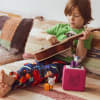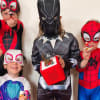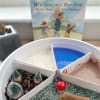What is small world play and how can Tonies enhance it?
Published 05/06/24 by Amy Blanchard

Hannah is going to take us on an adventure where even the smallest play can lead to big discoveries…
So, what is small world play?

How can small world play help my child’s development?
Small world play is wonderful for children as it nurtures their creativity and imagination. It allows them to practise social skills, as well as helping them understand the world around them. It also allows them to create imaginary worlds whilst building their vocabulary. Cool, right? It can benefit us parents too, as we can get stuck in and engage with our children on their level and on their terms. Who doesn’t like to look at the world through the eyes of a child now and then!
How can Tonies enhance my child’s play?
My son’s Tonie collection is made up of his favourite characters… I’m talking, Julia Donaldson and Disney with a sprinkling of PAW Patrol and Octonauts. He listens to them on a daily basis and is familiar with all the stories and songs (in fact, he sings many of them as he is going about his day). So when presented with a small world setup including Lightning McQueen, Captain Barnacles or Chase, he is immediately engaged and wants to dive right in (sometimes literally). Favourite characters or places give children a familiar base to start from, especially when just beginning their adventure into small world play. How exciting must it be for them to create PAW Patrol’s Adventure Bay in their own home?
- Best Seller
- Last Chance
- Best Seller
Following our kid’s interests in small world play can ensure that they stay engaged for longer and are more willing to explore (and in turn, we can enjoy a hot cup of tea!) My son was eager to recreate Radiator Springs after being introduced to Disney’s Cars. He spent ages driving around the roads, creating conversations between the characters and getting me involved too. We acted out real life scenarios like filling the cars up with petrol and laughed while mimicking the characters’ voices that he’s used to hearing on his Toniebox.
See what you think...
Children can learn so much from their favourite Tonies, not just vocabulary but they can also relate to the experiences of their favourite characters, which might cross over into their own lives – overcoming fears, making new friends, exploring somewhere new. Reenacting these scenes in small world play can reinforce their learning and development in the real world. Maybe Captain Barnacles and Kwazii are showing bravery in the face of a scary sea creature, or Chase and the rest of the pups are working together to help a friend in need.
Now, what will you need for small world play?
Gathering resources for small world play doesn’t need to break the bank. You can find some great bargains in charity shops or on preloved sites like Vinted and eBay. My son’s entire Cars Duplo collection was bought second hand, as well as some of his PAW Patrol and Octonauts toys. You can also use household or garden items that you already own, as well as materials that would otherwise be heading to the recycling bin.
Useful small world resources to have in your stash:
Favourite characters; these can be new, second hand or simply drawn onto some cardboard
Animal / dinosaur / insect figures; you can buy big tubs of these quite cheaply… or if Grandma is a hoarder, you can use your brother’s old ones from the 90s like we do!
Vehicles; these are readily available in charity shops or in big bundles on preloved sites
Roads; whether flexible road tiles, road tape or a DIY creation from cardboard
Natural resources; we love to use twigs, log slices, leaves, pine cones, conkers, sand, water, pebbles, shells etc.
Sensory elements; you can buy ready made coloured rice and pasta or make your own using paint or dye and a freezer bag!
Cardboard; you can use old boxes / tubes / containers to create buildings, landscapes, tunnels, etc.
Container; these can be useful to contain any sensory elements. We love to use a tuff tray or a play tray but a washing up bowl can do the job just as well!
Once you’ve gathered your resources, you can have fun building your own scene with your little helper, while listening to their favourite Tonies! Here is some inspiration to get you started:


For more play inspiration, you can follow Hannah on Instagram: @the_new_forest_nest
About Amy Blanchard

![[EN-GB ] - WBD 2 for £15](https://res.cloudinary.com/tonies/image/fetch/f_auto,q_30,c_fill,w_40,h_40,pg_1/https://images.ctfassets.net/l6vo76cztcax/5cZdH9LUyoWoJSfHHoHb1q/259c6a4f3aeb2decd3b5d09e1f034583/new-feature-menu-book-tonies.png)



![[EN-GB] - Featured Menu "Tonieplay"](https://res.cloudinary.com/tonies/image/fetch/f_auto,q_30,c_fill,w_40,h_40,pg_1/https://images.ctfassets.net/l6vo76cztcax/2zOANiqgrrL1Tlhib1POQU/a4363ff6cf1a624cc0f29c5535806669/736x736_Tonieplay.png)










